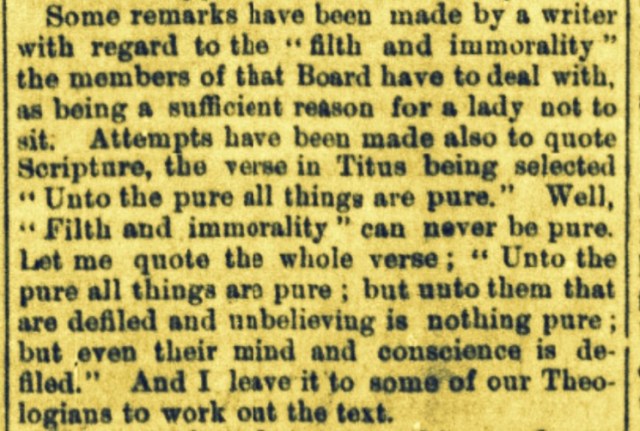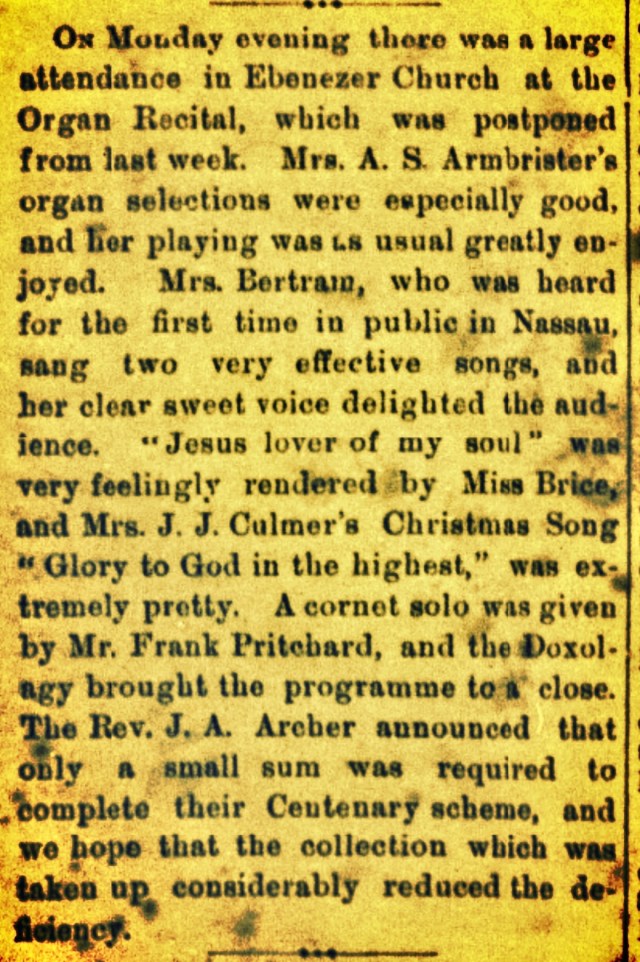
In January 1903, Mrs. Edith Bertram became the first woman, in the history of the Bahama Islands, to be appointed to a Public Board. Mrs. Bertram was appointed Commissioner of the New Providence Asylum.
Needless to say, there were many who objected for a myriad of reasons, namely of which, Mrs. Bertram was a woman.


N.P. Asylum housed all the insane persons, criminally and otherwise. They were housed together with indigents, geriatrics, physically and mentally disabled, alcoholics, attempted suicides, and those who would have qualified for the Victorian era workhouse. Men and women, young and old, sick and healthy were kept in the Asylum. Some had been sentenced to time there by the courts. Others were taken in, because they could not be cared for in society.
This was in a time before electricity had been invented. There was no indoor plumbing in such places. It was a filthy place to work as a native Bahamian. Quite naturally, it considered positively appalling for a genteel, married lady all the way from Cardiff —or so some thought.

Mrs. Bertram was the wife of the British appointed Attorney General of the Bahama Islands, Mr. Thomas Anton Bertram. Considering the time – 1903 – a continuing epoch in history, when women couldn’t vote or even inherit property from their fathers, Edith Bertram, was not your typical woman or housewife.


Before accompanying her husband to Nassau, Edith Bertram was an uncommon working woman, accomplished in her own right. She had been elected to the Cardiff Board of Guardians in Wales, as well as, a member of the Society for the Rescue of Fallen Women.
Fallen women is a particularly interesting term. It speaks to the time. Remember that in 1903, pregnant, unmarried women, or fallen women as they were called, were social pariahs. Shunned by society. Special charities had to be created to assist them. Edith Bertram assisted in this regard and more.
Bahamas Governor Gilbert T. Carter’s appointment of Mrs. Bertram caused considerable controversy across New Providence —- a woman was simply unthinkable!
There had been a recently considered candidate for the position of Commissioner of the N. P. Asylum. His appointment was rejected because he was Roman Catholic. In the early 1900s, Catholicism was still viewed as a controversial, usurping religion, especially across England’s staunchly Anglican, Church of England colonies. Rome was still trying to regain the political influence it had lost some 400 years prior under the reign of Henry VIII. Catholic influence, in the colonies, was not to be encouraged. There was considerable discrimination based on religion.


There were objections to the fact that Mrs. Bertram was not native. In other words, it’s not that she was not Bahamian, it was meant she wasn’t a negro.
Imagine that in 1903, for the first and probably only time in Bahamian colonial history, someone cared that a foreigner wasn’t a native.
Why was this a problem in this instance?
What so many wanted to say, but couldn’t, without igniting a storm of racial bitterness and anger, was that Mrs. Bertram was white. Of the inmates at the New Providence Asylum, mostly sad souls, walking about in various states of mental illness and undress, many were black men. In fact, based on probabilities, most were black men. Big, black, half naked men. Black men with black —— in front of a white woman, from Cardiff of all places, in 1903, was every fear in polite white society.
Of the poor women kept in the N. P. Asylum, undoubtedly, all manner of depravities and indignities were visited upon them by the men who worked there. With a woman like Mrs. Bertram now in charge, Governor Gilbert T. Carter probably hoped that whatever degrading circumstances, and treatment, which existed would change.



Another point of view said…

Another argued…

Well put on the matter…

Mrs. Edith Bertram first woman appointed to a Public Board in The Bahamas, and her husband Mr. Thomas Anton Bertram. Bertram would go on to become Sir and Edith, Lady Bertram.

Sir Anton Bertram (Feb 8, 1869, Barnstable, Devon – Sept 17, 1937, Canterbury, Kent), an English Barrister and 22nd Chief Justice of Ceylon (1918-1925)
In 1930 he published “The Colonial Service”
“Sir Anton Bertram, a former Chief Justice of Ceylon, who is seriously ill at his home in the precincts of Canterbury Cathedral, was stated last night to be “very much weaker.” Sir Anton is 68.” The Yorkshire Post, Friday, September 17, 1937
http://www.machadoink.com/The%20Precincts.htm





